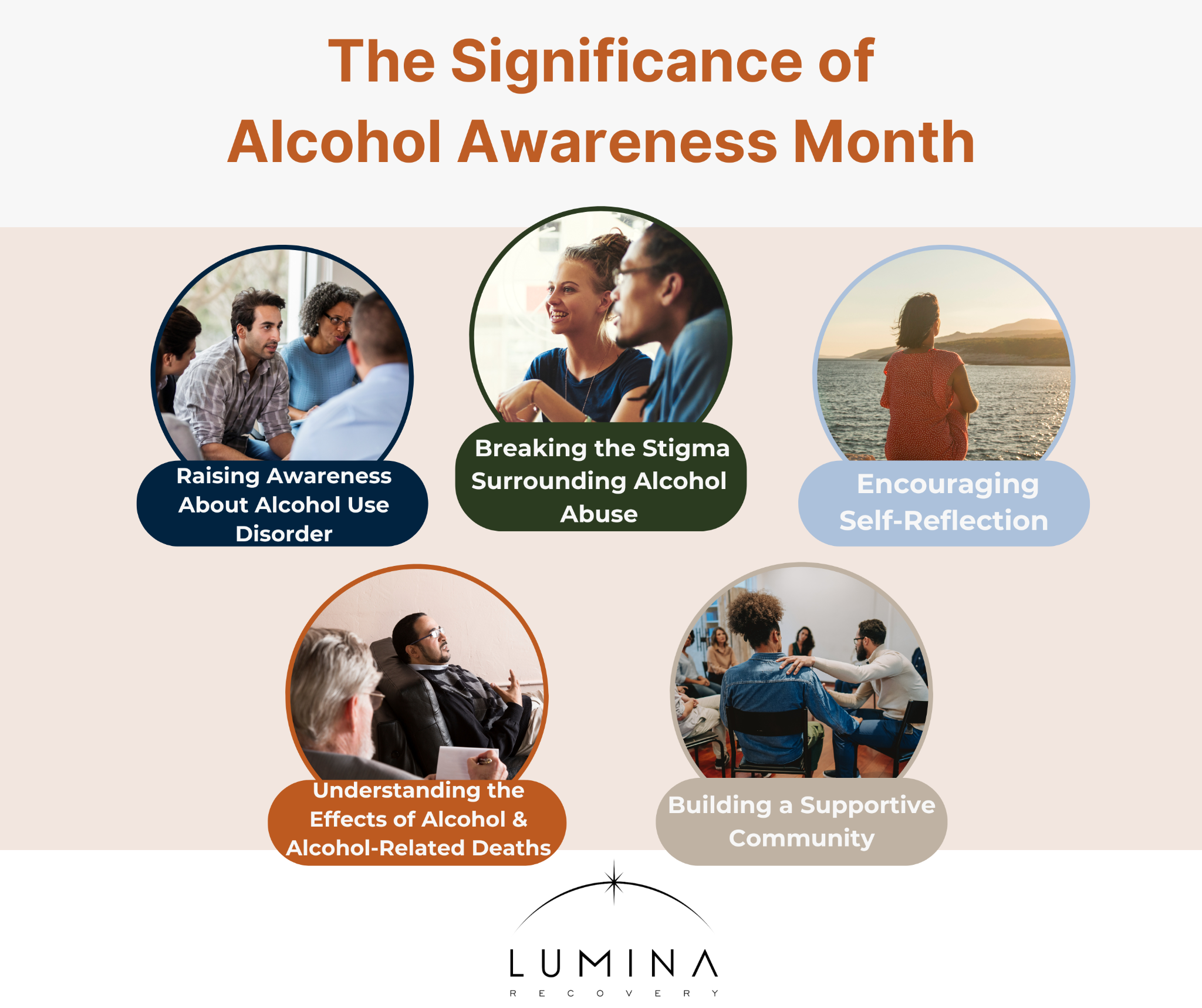Every April, Alcohol Awareness Month serves as a crucial time for reflection, education, and community support around alcohol misuse and addiction.
Established by the National Council on Alcoholism and Drug Dependence (NCADD) in 1987, this month aims to increase awareness and understanding about the dangers of excessive alcohol consumption and the importance of recovery.1
For individuals in recovery, Alcohol Awareness Month is an opportunity for self-reflection, reaffirming commitments to sobriety, and advocating for change in their communities. Whether you’re in early recovery or have years of sobriety behind you, using this month to reinforce your commitment to sobriety can make a meaningful impact.

The Significance of Alcohol Awareness Month
Alcohol Awareness Month is a powerful opportunity to bring attention to the impact of alcohol misuse on individuals, families, and communities. It serves as a time for education, dialogue, and meaningful action toward prevention and recovery.
1. Raising Awareness About Alcohol Use Disorder (AUD)
Alcohol Awareness Month plays a pivotal role in educating the public about alcohol use disorder (AUD), a chronic disease that affects millions of people worldwide. Many individuals may not recognize their drinking habits as problematic, making awareness efforts essential for early intervention and finding treatment.
This month serves as a reminder that alcohol addiction is a medical condition and not a moral failing. It encourages conversations that break down misconceptions and provide resources for those struggling.
2. Breaking the Stigma Surrounding Alcohol Abuse
Despite growing awareness, there is still stigma surrounding addiction, alcohol abuse, and recovery. Many people hesitate to seek treatment due to fear of judgment. Alcohol Awareness Month fosters open conversations about addiction, helping to reduce shame and encourage individuals to seek help without fear.
By sharing personal stories of recovery, individuals can help dismantle negative stereotypes and inspire others to take steps toward healing. Parents and caregivers can also use this time to have discussions with their children about underage drinking, setting the foundation for healthier habits.
3. Encouraging Self-Reflection
For those in recovery, self-reflection is a critical part of maintaining sobriety. Alcohol Awareness Month provides an excellent opportunity to pause and evaluate personal growth, challenges, and future goals.
- How has alcohol affected your life?
- What strategies have helped you maintain sobriety?
- Are there areas where you could improve your recovery approach?
Answering these questions can reinforce motivation and highlight the progress made.
4. Understanding the Effects of Alcohol and Alcohol-Related Deaths
Alcohol affects nearly every organ in the body, contributing to alcohol-related deaths and long-term health complications.
Excessive alcohol consumption is responsible for approximately 178,000 deaths in the United States annually, making it one of the leading preventable causes of death in the United States.2
Educating people on the effects of alcohol can help them make informed decisions about their drinking habits, whether they want to cut down or quit drinking, and seek treatment options when needed.
5. Building a Supportive Community
Recovery thrives on connection and support. Alcohol Awareness Month encourages individuals to engage with support groups, therapy, and community events to strengthen their recovery networks.
Many organizations host educational events, online forums, and local gatherings to provide support and resources. Participating in these activities can help individuals feel more connected and supported in their recovery journey.

How to Use Alcohol Awareness Month to Strengthen Your Recovery
Alcohol Awareness Month provides an opportunity for individuals in recovery to recommit to their sobriety, build awareness, and support others on their journey. Here are some ways to make the most of this time:
1. Reflect on Your Recovery Journey
Taking time to reflect on your progress, struggles, and achievements can be incredibly empowering. Use this month to:
- Journal about your recovery journey including what has worked, what challenges you’ve faced, and what inspires you to keep going.
- Celebrate milestones, whether it’s one month or ten years of sobriety, to reinforce your commitment.
- Identify areas for improvement, such as incorporating new coping strategies or seeking additional support if needed.
2. Educate Yourself and Others
Knowledge is a powerful tool in recovery. This month, take the time to:
- Learn more about mental health and addiction through books, addiction podcasts, or online resources.
- Share facts and resources with loved ones to help them better understand alcohol use disorder and recovery.
- Engage in conversations about responsible drinking with friends and family to promote awareness and prevention.
3. Participate in Awareness Campaigns
Many organizations run awareness campaigns throughout April to educate the public on alcohol addiction. You can contribute by:
- Joining local or virtual events, such as community discussions, webinars, or social media campaigns.
- Using social media to share statistics, personal experiences, or resources about alcohol use disorder.
- Encouraging workplaces or schools to offer educational programs about addiction and recovery.
4. Strengthen Your Support System
Recovery is more sustainable with a strong support system. Alcohol Awareness Month is an excellent time to:
- Reconnect with support groups like Alcoholics Anonymous (AA), SMART Recovery, or online communities.
- Attend extra therapy sessions to reinforce coping mechanisms.
- Engage in sober-friendly social activities to build connections with like-minded individuals.
Find Lasting Sobriety With Lumina Recovery
Alcohol Awareness Month is more than just an educational initiative—it’s an opportunity for individuals in recovery to reflect, grow, and advocate for change. By using this time to strengthen commitment, educate others, and build supportive communities, people in recovery can make a lasting impact on themselves and those around them.
At Lumina Recovery, we understand the importance of ongoing support and education in addiction recovery. Our inpatient programs and therapy services, including cognitive behavioral therapy (CBT) and group therapy, offer individuals the tools they need to maintain long-term sobriety.
If you or a loved one is navigating recovery, take the first step today. Contact Lumina Recovery for professional, compassionate support. Your journey to lasting healing starts now.
Sources:


